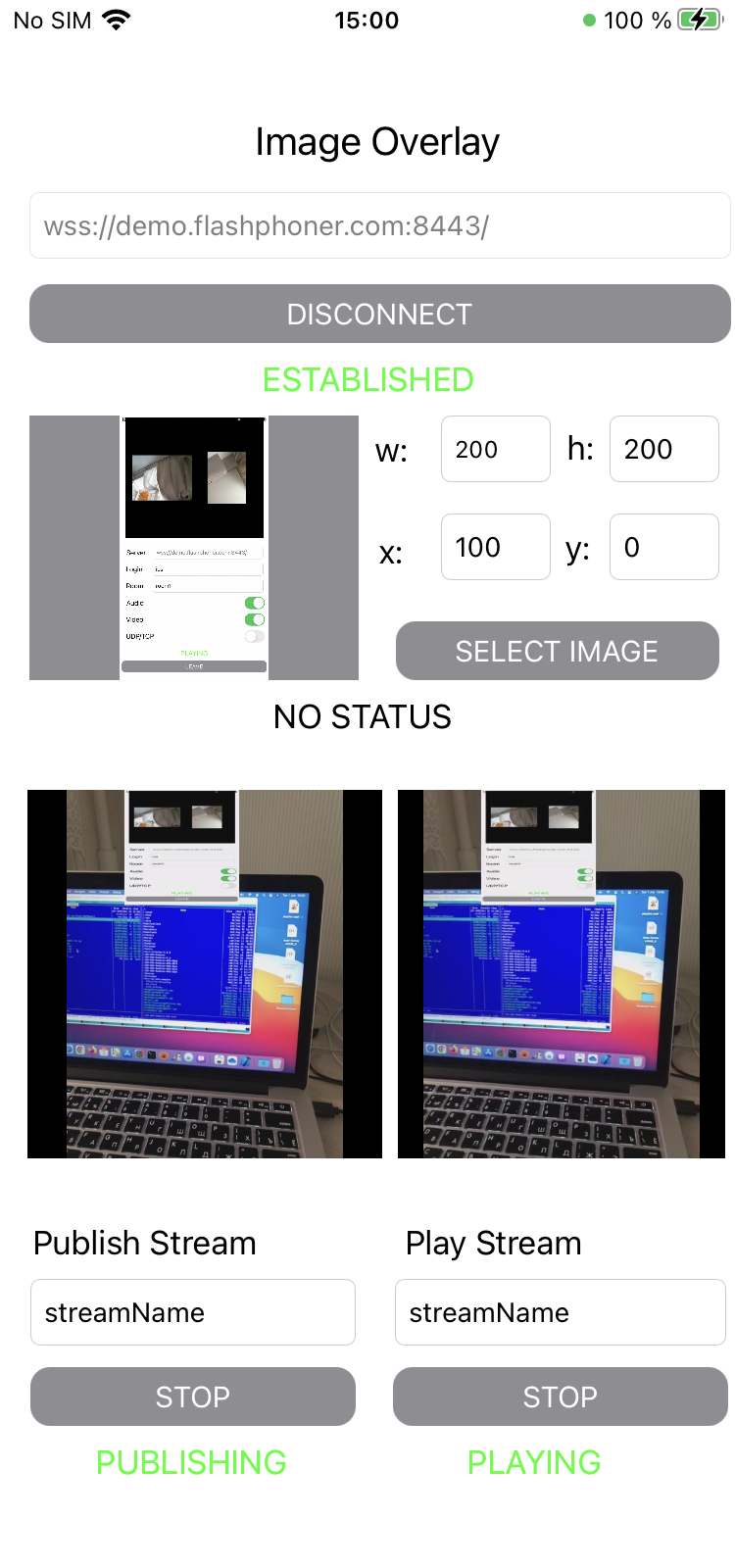A video published zooming and picture overlaying example
The example shows how to zoom video published (zoom in and zoom out by pinching) and how to overlay a picture from device gallery.
On the screensot below, the picture is added to video to the position defined with resizing.
Inputs:
- WCS URL - WCS server address
- w - picture overlaing width
- h - picture overlaying height
- x - picture top left corner position by horizontal axis
- y - picture top left corner position by vertical axis
- Select image - picture choose from gallety button
The picture, its size and placement can be changed during stream publishing on the fly.
Analyzing the code
To analyze the example code take ImageOverlaySwift example version which is available on GitHub:
- ImageOverlayViewController - main application view class (implementation file ImageOverlayViewController.swift)
- CameraVideoCapturer - class to implement video capturing and handling (implementation file CameraVideoCapturer.swift)
1. API import
import FPWCSApi2Swift
2. Video capturer initialization
var capturer: CameraVideoCapturer = CameraVideoCapturer()
3. Session creation and connecting to the server
WCSSession, WCSSession.connect code
The following session parameter are set:
- WCS server URL
- server backend application name defaultApp
@IBAction func connectPressed(_ sender: Any) {
changeViewState(connectButton, false)
if (connectButton.title(for: .normal) == "CONNECT") {
if (session == nil) {
let options = FPWCSApi2SessionOptions()
options.urlServer = urlField.text
options.appKey = "defaultApp"
do {
try session = WCSSession(options)
} catch {
print(error)
}
}
...
changeViewState(urlField, false)
session?.connect()
} else {
session?.disconnect()
}
}
4. Stream publishing
WCSSession.createStream, WCSStream.publish code
The following parameters are passed to createStream method:
- stream name to publish
- local video view
- video capturer object
@IBAction func publishPressed(_ sender: Any) {
changeViewState(publishButton,false)
if (publishButton.title(for: .normal) == "PUBLISH") {
let options = FPWCSApi2StreamOptions()
options.name = publishName.text
options.display = localDisplay.videoView
options.constraints = FPWCSApi2MediaConstraints(audio: true, videoCapturer: capturer);
do {
publishStream = try session!.createStream(options)
} catch {
print(error);
}
...
do {
try publishStream?.publish()
capturer.startCapture()
} catch {
print(error);
}
} else {
do {
try publishStream?.stop();
} catch {
print(error);
}
}
}
5. Stream playback
WCSSession.createStream, WCSStream.play code
The following parameters are passed to createStream method:
- stream name to play
- remote video view
@IBAction func playPressed(_ sender: Any) {
changeViewState(playButton,false)
if (playButton.title(for: .normal) == "PLAY") {
let options = FPWCSApi2StreamOptions()
options.name = playName.text;
options.display = remoteDisplay.videoView;
do {
playStream = try session!.createStream(options)
} catch {
print(error)
}
...
do {
try playStream?.play()
} catch {
print(error);
}
} else{
do {
try playStream?.stop();
} catch {
print(error);
}
}
}
6. Stop stream playback
WCSStream.stop code
@IBAction func playPressed(_ sender: Any) {
changeViewState(playButton,false)
if (playButton.title(for: .normal) == "PLAY") {
...
} else{
do {
try playStream?.stop();
} catch {
print(error);
}
}
}
7. Stop stream publishing
WCSStream.stop code
@IBAction func publishPressed(_ sender: Any) {
changeViewState(publishButton,false)
if (publishButton.title(for: .normal) == "PUBLISH") {
...
} else {
do {
try publishStream?.stop();
} catch {
print(error);
}
}
}
8. Zooming function call by pinching local voideo view
@IBAction func pinchOnLocalDisplay(_ sender: UIPinchGestureRecognizer) {
if sender.state == .changed {
self.capturer.scale(velocity: sender.velocity)
}
}
9. Picture choosing from gallery and claaing function to update image to overlay
@IBAction func selectImagePressed(_ sender: Any) {
imagePicker.allowsEditing = false
imagePicker.sourceType = .photoLibrary
DispatchQueue.main.async {
self.present(self.imagePicker, animated: true, completion: nil)
}
}
func imagePickerController(_ picker: UIImagePickerController, didFinishPickingMediaWithInfo info: [UIImagePickerController.InfoKey : Any]) {
guard let image = info[.originalImage] as? UIImage else {
return;
}
selectedImage = image
imageView.image = selectedImage
updateOverlayImage()
DispatchQueue.main.async {
picker.dismiss(animated: true, completion: nil)
}
}
10. Image resizing, position calculation and function calling to update image to overlay
func updateOverlayImage() {
if let selectedImage = selectedImage {
let resizeImage = resize((selectedImage.cgImage)!, selectedImage.imageOrientation)
let overlayImage = CIImage.init(cgImage: (resizeImage)!)
let overX = CGFloat(Int(overlayX.text ?? "0") ?? 0)
let overY = CGFloat(Int(overlayY.text ?? "0") ?? 0)
let movedImage = overlayImage.oriented(.left).transformed(by: CGAffineTransform(translationX: overY, y: overX))
capturer.updateOverlayImage(movedImage)
} else {
capturer.overlayImage = nil
return
}
}
11. Video scaling implementation
func scale(velocity: CGFloat) {
guard let device = self.device else { return }
let maxZoomFactor = device.activeFormat.videoMaxZoomFactor
let pinchVelocityDividerFactor: CGFloat = 15
do {
try device.lockForConfiguration()
defer { device.unlockForConfiguration() }
let desiredZoomFactor = device.videoZoomFactor + atan2(velocity, pinchVelocityDividerFactor)
device.videoZoomFactor = max(1.0, min(desiredZoomFactor, maxZoomFactor))
} catch {
print(error)
}
}
12. Image overlaying implementation
let pixelBuffer = CMSampleBufferGetImageBuffer(sampleBuffer)
...
if (overlayImage != nil) {
let inputImage = CIImage.init(cvImageBuffer: pixelBuffer!);
let combinedFilter = CIFilter(name: "CISourceOverCompositing")!
combinedFilter.setValue(inputImage, forKey: "inputBackgroundImage")
combinedFilter.setValue(overlayImage, forKey: "inputImage")
let outputImage = combinedFilter.outputImage!
let tmpcontext = CIContext(options: nil)
tmpcontext.render(outputImage, to: pixelBuffer!, bounds: outputImage.extent, colorSpace: CGColorSpaceCreateDeviceRGB())
}
